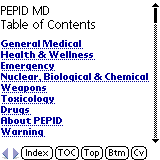 |
|
|
If you want it all and you want it on your PDA, you might be interested in the progress being made with PEPID. PEPID is the Portable Emergency and Primary Care Information Database. It represents a new breed of all-in-one medical reference packages. PEPID endeavors to go beyond the "suite" of compatible products to provide a single, all encompassing reference for clinicians. Drug data, disease information, lab references, clinical calculators, even nutrition information and complementary medicine are integrated into this software. PEPID comes in in six flavors: PEPID MD, PEPID ED, PEPID MSC ( for medical students), PEPID RN, PEPID EMS, and PEPID PDC (a stand alone drug database). PEPID MD is designed for Primary Care docs and General Internists. The database is reported to cover 1600 conditions including topics in Medicine (Hematology, Derm, ID, Neurology, Pulmonary, Cardiovascular, GI, Nephrology, Rheumatology) Obs/Gyn, Paeds, Geriatrics, Surgery (Ortho, ENT, Urology ) and Psychiatry. Trauma and chronic illnesses aren't overlooked either.
There is an equation section, which provides normals, clinical calculations, Canadian drug names and a conversion calculator for US and SI units: tap on the name of the test (e.g. glucose) and get a conversion factor. Tap again and enter your value, and it will convert the value for you. There are guidelines, preventive medicine topics and, sign of the times: a section on nuclear, biologic and chemical weapons. It is tough to be everything to everyone. How does it work? It's surprisingly fast. The program loads quickly and there are almost no delays while running it. It can be used like a typical book, with a table of contents organized by system. It also has a subject index, complete with an onscreen keyboard to select the first letters of your desired topic. The navigation is intuitive and the screen uncluttered. At the top of most information screens are links to "Related Topics" and a jump to "Tx" (Treatment). At the bottom are forward and back arrows and links to the Index, the TOC, the top and bottom of your document and the conversion equations. While PEPID tries to cover ambulatory, inpatient and emergency management, the content bears a bias towards the ER. While PEPID has extensive information on trauma, I couldn't find anything on such common ambulatory problems as erectile dysfunction or hormone replacement therapy. There is good drug data too, but don't expect the same scope or detail as a full sized pharm program. It also does not have an interaction module, which is a significant shortcoming. However one is planned for a future release. The clinical calculator is not as useful as one would like. In many cases (e.g. creatinine clearance) it simply gives the formula and you have to calculate it yourself. The version I tested (downloaded September 2002) did not have a BMI calculator, pregnancy "wheel" or coronary risk assessment tool. I use these commonly in my practice and they are standard in other products such as MedCalc. Upgrades to this feature have been announced but not yet implemented. Regarding a pregnancy wheel, the next scheduled update (mid to late November 2002) will include: a pregnancy calculator, a Glasgow coma scale calculator, an A-a gradient calculator and an IV drip rate calculator. I also found errors. The calculator used to convert between SI and US units had a problem that affected numerous conversions. Rather than doing floating point math, it seemed to truncate conversion factors at two decimal places, which created errors of up to 67% in many of the results. The company has assured me that this will be corrected. I also found an error in one of the drug monographs. While you do not completely rely on your PDA for management decisions, such mistakes can be disconcerting. To run PEPID MD you need a substantial amount of memory: 4.5 Mb of space for a Palm OS device and 6.4 for Windows CE handhelds. It also takes up over 20 Mb on your PC. That sounds like a big chunk of real estate, but if this product could replace your textbook and drug reference and calculator, this is actually not that much memory. It also seems to run without problem on memory cards. The product provides free updates for the duration of the anual subscription, which runs $109.95 for a year. An installment plan has been announced for late 2002. The program does not auto-update. Mac users can still use the product on their Palm device but they need a CD, available by mail, for installation. I have used PEPID for over a month now, and I consult it frequently. It is easy to use, and impresses other clinicians. However, it has not yet achieved the lofty status of the all-in-one reference. I still find the need to use my drug program, my clinical calculator and my other medical references. My final assessment is that PEPID is a very worthy investment,
especially if you work in the ER. However, it will need improvement
before it is a true all-in-one package I can depend on. It appears
the company is committed to enhancements and upgrades, and as
long as they do, this is one product I will stick with. Stewart can be reached by email. Get your copy of PEPID MD for the Palm OS here and for the Pocket PC here A complete listing of PEPID products is available here
|
|||||||||||||

